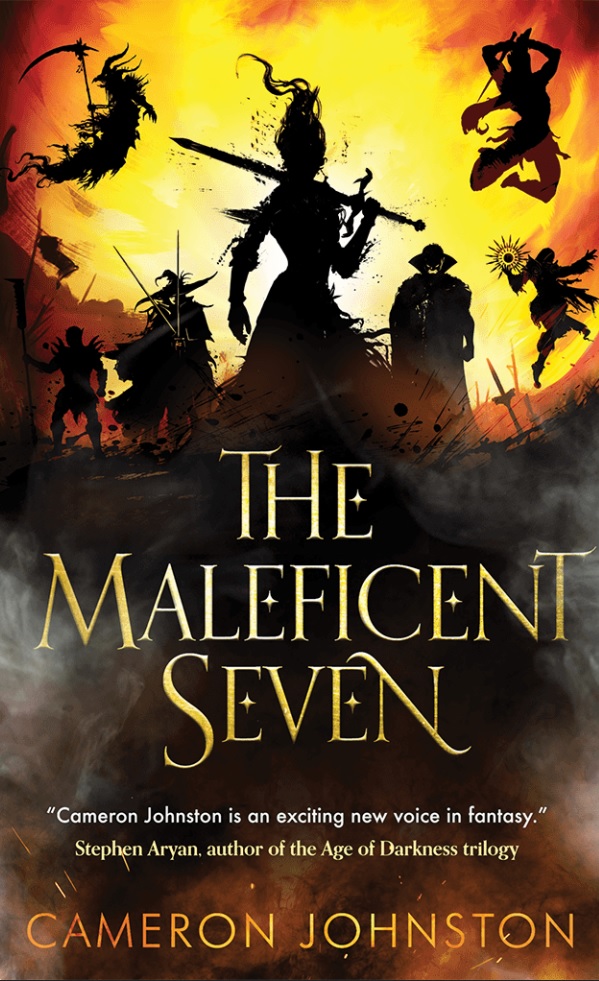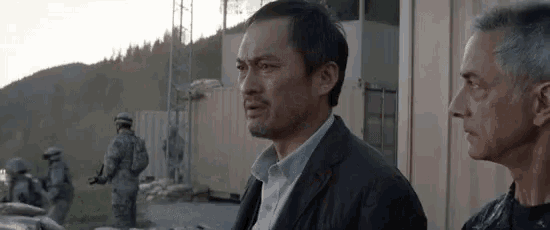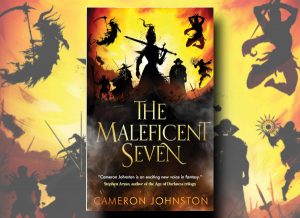THE MALEFICENT SEVEN By Cameron Johnston (BOOK REVIEW)
Note: This review includes mild spoilers for the prologue and first few chapters of The Maleficent Seven.
A ruthless necromancer trapping souls to forge the ultimate weapon. A bloodthirsty shapeshifter who eats human hearts and tears people to shreds. A mass-murdering alchemist who has already poisoned and murdered hundreds of innocent men, women, and children. And finally, their demon-summoning leader, a woman who consigns hundreds of souls to endless demonic torment without any remorse.
In any other story, any of these immoral horrors would be a sufficient threat for a brave party of heroes to face, but in this case of Cameron Johnston’s The Maleficent Seven, none of them is the antagonist. They’re fighting against the zealous mass-murdering antagonist to save the world, and they all hate each other.
So, let’s back up a bit.
 The Maleficent Seven opens with Dalia, otherwise known as the Black Herran, at the head of an army that rivals the most terrifying ever put to page. Her army (which includes the aforementioned necromancer, shapeshifter, alchemist, and others) is on the eve of conquering the final bastion of resistance and slaughtering all the innocent civilians sheltering inside. At the moment, Dalia is busy feeding the souls of the captive nobles and commanders who bravely fought against her to hell.
The Maleficent Seven opens with Dalia, otherwise known as the Black Herran, at the head of an army that rivals the most terrifying ever put to page. Her army (which includes the aforementioned necromancer, shapeshifter, alchemist, and others) is on the eve of conquering the final bastion of resistance and slaughtering all the innocent civilians sheltering inside. At the moment, Dalia is busy feeding the souls of the captive nobles and commanders who bravely fought against her to hell.
Yet Dalia’s ambitions stretch even beyond revenge. Once she snuffs the final light of resistance, she will complete her dark pact with a demon lord and feed the entire world to his demonic army – keeping the country she’s just razed to the ground for herself, of course. In this case, the darkest of evils has won.
Yet the night before Dalia would declare total victory and doom the world, she simply disappears.
And while everything does go to hell after that, it’s the Black Herran’s army that suffers, not the world. Without Dalia to lead them, her final siege of the final city collapses. Her army devours itself, allowing the world’s last few defenders to survive and rout them. The world survives, and no one knows why.
Least of all the many powerful generals the Black Herran gathered, commanded, and abandoned.
Forty years later, the Black Herran returns to Maeven—the necromancer general who lost her brother and sister as Dalia’s army imploded—with an offer. If Maeven gathers Dalia’s other six generals, and rallies all of them to help Dalia defend the tiny town of Tarnbrooke from the Falcon Knight and the zealous forces of the Bright One, Dalia will help Maeven accomplish what she’s failed to do for years.
To find her traitorous brother, kill him, and rescue her innocent sister from endless imprisonment.
A bargain is struck. Maeven, despite hating the Black Herran and plotting to kill her once all is done, goes to find the generals scattered forty years ago and reunite them … all to defend a tiny backwater town.
That’s not to say all of the Black Herran’s generals are awful people. There’s a strange sort of honor to be found in the others: the veteran pirate queen who protects her people with a ruthless but genuinely selfless hand, the fallen war god of a bard of murderous reavers who still has a soft spot for kids, and the mighty elder orc who seeks only to test herself in battle one last time against the strongest warrior in the world: the Falcon Knight, leader of the Lucent Army and chosen champion of the Bright One.
Despite their claims of righteousness, the Lucent Army is, obviously, a band of zealous mass-murdering jerks. They actually intend to unite the world by murdering half of it, including anyone who isn’t fanatically loyal to their Bright One and her Falcon Knight, and are now as great a threat as the Black Herran’s army was forty years ago. The only difference is they’ve painted their armor white.
I’m going to stop my summary there to avoid spoiling the rest of an absolutely terrific ride, but if the story hasn’t hooked you by this point, it may not be for you. While it may seem that such delightfully awful characters couldn’t carry a story, they not only carry the story, the do so in a thrilling fashion.
For me, what makes the battle between Dalia’s seven monstrous generals and the Lucent Army such a fun grimdark ride is best described in the worlds of Dr. Ishiro Seriza. And those words are:

You don’t necessarily need to sympathize with Dalia and her seven generals to enjoy their battle to save Tarnbrooke. They’re a band of monstrous people doing all the right things for the wrong reasons, yet many have ulterior goals that are relatable and even noble, in their own way. Moreover, the story has excellent pacing. We begin with a rousing “get the band back together” first arc, followed by the brutal and thrilling battle of Tarnbrooke itself, and a final epic act where the true motives of all are revealed.
While I wouldn’t say I necessarily sympathized with all of Dalia’s powerful generals, Johnston’s excellent writing and layered character portrayals ensured I understood them. More importantly, Johnston keeps every last character entertaining and memorable. I was both cheering for the Maleficent Seven to win and hoping half of them died. I even (almost) hoped the mass-murdering alchemist might escape.
In case it wasn’t clear, The Maleficent Seven is a decidedly grimdark book. Those who are genuinely noble and selfless rarely survive, and most of the main characters are a monster of one sort or another. The battles are dirty, brutal, and vicious in the same way as any war movie, and while many of the Lucent Army are evil, many more are hapless conscripts sacrificed like pawns in chess – a reality of war.
Yet despite the dark setting and darker goals of the characters, The Maleficent Seven hooked me from the first chapter and kept me hooked to the end. It’s a thrilling ride like the best kaiju movie, where two monstrous giants fight for dominance while crushing the world around them. And the small moments Johnston sprinkles in, where good triumphs and true hope rises, are all the more meaningful as a result.
The Maleficent Seven is a thrilling, dark, and exceedingly bloody book, and it’s a must read for all who enjoy epic grimdark fantasy, creative worldbuilding, and genuinely compelling evil characters.

